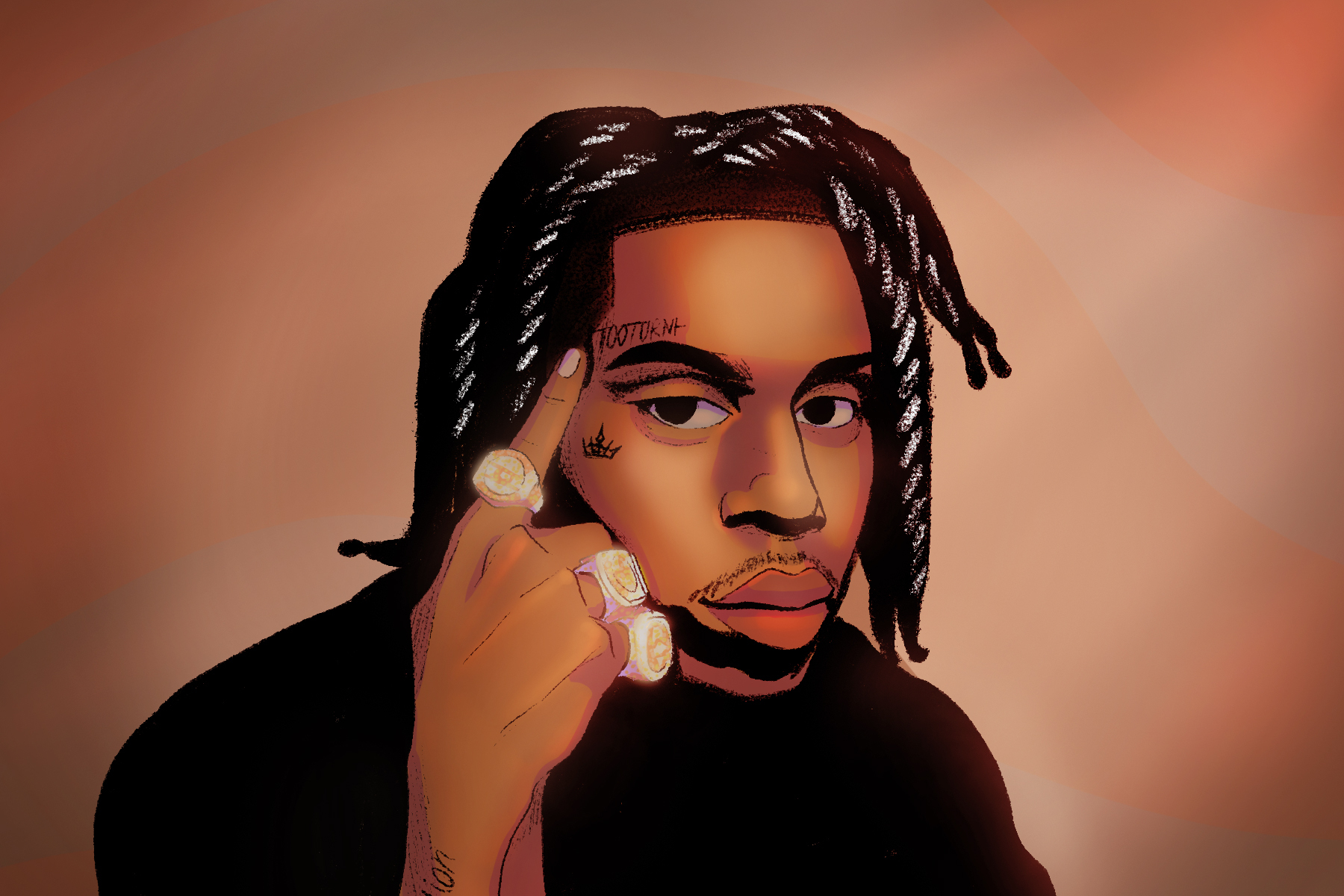Taurus Bartlett, otherwise known by his stage name, Polo G, is only 22 years old, but he’s been a considerable force in the music scene since his 2019 single “Pop Out” released. “Pop Out” would go on to hit No. 11 on the Billboard Hot 100 list and pave the way for Polo G’s first album, “Die A Legend.” This album and its follow-up LP “THE GOAT” both received critical acclaim and commercial success.
Polo G’s sprawling new album, “Hall of Fame,” does all it can do to live up to its predecessor’s prior success and solidify the artist’s new career. The album’s lyrics, especially in its more vulnerable moments, elevate Polo G’s music from casual listening to emotional catharsis.
Or, at least, it almost does. “Hall of Fame” lacks the force necessary to not only expel negative emotions momentarily but also to replace them with fresh air. The album lacks redemption.
Polo G does recognize both systemic injustice and his own personal demons in “Hall of Fame” — he just fails to offer a takeaway. Throughout the album, Polo G slips back into the underlying problems with the very systems he rails against, trapped in a cycle of trauma and selfishness, and it doesn’t feel pointed or intentional. The artist steps off the hamster wheel just long enough to comment on it, then jumps back on and starts running again.
A Mess of Contradictions
Polo G boasts of his killings and laments the loss of his friends due to gang violence. He writes beautiful elegies to his girlfriend in the song “So Real,” but then goes on to threaten her with violence in “Toxic.” The artist’s honesty is admirable, and the conflict in these songs realistically portrays the consequences of trauma.
In “For the Love of New York,” which is one of the many songs featuring collabs with other artists on the album, the artist raps about his turbulent relationship with his girlfriend. One of the lines he drops is particularly evocative: “If I wasn’t so heartless, you could have mine.” These words exemplify the internal conflict of “Hall of Fame.” Polo G craves to love another person but he can never quite muster up the self-sacrifice necessary to make that love real. As a result, he falls just short of winning his audience’s heart.
However, that doesn’t mean that he doesn’t earn our respect. Polo G’s vulnerable storytelling — his direct acknowledgment of untimely death, gang violence, drugs and deep internal sadness — is courageous and compelling. It’s the sense of rawness and honesty that holds the album to a higher standard than those of Polo G’s contemporaries.
The theme of religion, for instance, which recurs throughout the album, helps unravel whether Polo G intentionally tries to deceive his audience or if something deeper is at work. In “Black Hearted,” Polo G sang, “Long-distance relationship with God, so it get hard to pray.” This simultaneous longing for a relationship with God and conscious separation from him proves thematic; in “Zooted Freestyle,” Polo G addresses God, saying, “I can’t say I’m sorry ’bout some s— that I’m gon’ do again.” These lines are exemplary of the idea that Polo G — or at least the speaker of his narrative — wants things to be different but that he just can’t bring himself to put the work into changing.
He isn’t alone. But Polo G’s honesty still begs the question: Who is this album for? Who can it help? Maybe its hopelessness connects Polo G to his audience. Maybe “Hall of Fame” releases the emotions of those who feel just like Polo G but who don’t have the words to express their desperation.
Underlying Sadness
“Hall of Fame” feels melancholy even when it aspires for bravado. Much of the album, including the well-crafted hit “RAPSTAR,” fails to convince listeners that the speaker is really celebrating his success. Rather, it gives the impression that Polo G is dreading the possibility of failure.
Polo G’s language implies this sadness, even when he seems to be bragging: “I hear planes flyin’, crowds screamin’, money counters, chains clangin’ / S—, I guess that’s how it sound when you winnin’.” In these lines, Polo G describes himself from high above. The speaker’s success not only feels distant but also foreboding. Can Polo G really handle his newfound fame, or will it swallow him whole?
A couple of lines later in the song, the rapper spat, “So high up through the clouds, I was swimmin’/ I’m probably gon’ drown when I’m in it.” In this instance, the word “drown” almost literally dampens the song’s tone.
This feeling of watchful anxiety, of knowing something bad could happen at any moment, steeps the album. Again, the song “RAPSTAR” is emblematic of this sorrow: “Anxiety killin’ me, I just want to leave Earth / When they ask if I’m okay, it just make everything seem worse / Try and explain your feelings, sound like something you rehearsed.”
The rapper sounds best when he unleashes his unfiltered introspection and melancholy, especially when he combines his lyricism with dark, moody sounds. In the words of online magazine Stereo Gum, “‘Hall Of Fame’ is full of pianos, acoustic guitars, and low synth tones — soft and pretty and unshowy beats that give Polo plenty of room to find melodies.”
A sense of purpose energizes the album. In “Painting Pictures,” Polo G rapped, “God, I know I’m nothin’ like them / I’m just different, I’m built different / I feel as if we all got a purpose and we all special in some way / But me, my potential is unmatched / I’m the chosen one.”
In an interview with the lyric decoder platform Genuis, Polo G elaborated on his conviction. “I started feeling chosen when I really took the path of wanting to be a rapper,” he explained. “I had involvement in the streets too, but I don’t know, it was like I had angels looking over me… cause there was a lot of situations where it was like ‘damn, why didn’t it go this way?’”
The platform Hot New Hip Hop addresses Polo G’s emphasis on purpose; as expressed by reviewer Robert Blair, “Rather than spend too much time lamenting without any shred of light, tracks such as megahit “RAPSTAR” and The Kid LAROI and Lil Durk-assisted “No Return” see the agony repurposed as fuel.”
Although Polo G’s sense of purpose propels the album, it does not make it whole. “Hall of Fame” is still, in a sense, waiting to be fulfilled — waiting for Polo G to have his heart broken just a little bit more, just enough to change.
Right after the “chosen one” line, Polo G added, “But only time’ll tell.” The artist is right — only time will tell, not only with regard to the lasting acclaim of “Hall of Fame,” but also to Polo G’s own self-awareness and well-being.
















